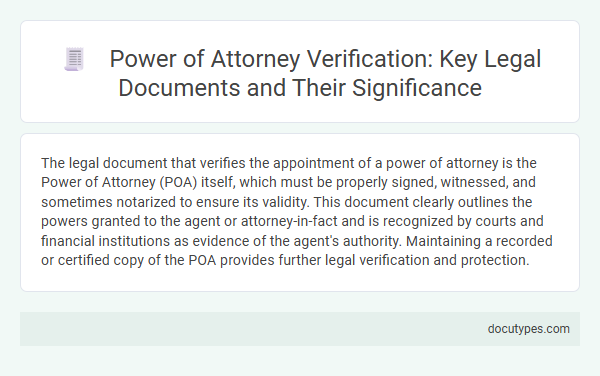The legal document that verifies the appointment of a power of attorney is the Power of Attorney (POA) itself, which must be properly signed, witnessed, and sometimes notarized to ensure its validity. This document clearly outlines the powers granted to the agent or attorney-in-fact and is recognized by courts and financial institutions as evidence of the agent's authority. Maintaining a recorded or certified copy of the POA provides further legal verification and protection.
Introduction to Power of Attorney Verification
The legal document that verifies the appointment of a Power of Attorney is essential for confirming the authority granted to an agent. Understanding this verification ensures your rights and intentions are legally recognized.
- Power of Attorney Document - This primary legal instrument authorizes an agent to act on behalf of the principal.
- Notarization - A notarized Power of Attorney provides official validation that the principal signed the document willingly.
- Recording with Government Office - Certain types of Power of Attorney must be recorded with a county or state office to verify and enforce the agent's authority.
Importance of Legal Document Authentication
The legal document that verifies the appointment of a Power of Attorney is commonly known as the Power of Attorney deed. Proper authentication of this document is crucial to ensure its validity and prevent fraud.
- Notarization - Official notarization confirms the authenticity of signatures on the Power of Attorney deed.
- Registration - Registering the document with the appropriate government office provides legal recognition and public record.
- Verification by Witnesses - Witness statements validate that the principal willingly appointed the agent without coercion.
Your awareness of the importance of legal document authentication protects your rights and interests in Power of Attorney matters.
Types of Power of Attorney Documents
A legal document that verifies the appointment of a Power of Attorney is known as the Power of Attorney agreement itself, a formal instrument signed and notarized to grant authority. This document outlines the scope and limitations of the agent's power to act on behalf of the principal.
There are several types of Power of Attorney documents, including General, Durable, Special, and Healthcare Power of Attorney. Your choice depends on the extent of authority you wish to grant and the specific situations in which the agent will act.
Essential Components of a Valid Power of Attorney
A legal document that verifies the appointment of a Power of Attorney is called the Power of Attorney (POA) agreement. This document formally grants authority to an individual, known as the agent or attorney-in-fact, to act on behalf of the principal in legal and financial matters.
Essential components of a valid Power of Attorney include the principal's clear intent to grant authority, the agent's identification, and detailed scope of powers. The document must be signed by the principal and often requires notarization or witness signatures to ensure its authenticity. Compliance with state-specific legal requirements is critical to enforce the POA effectively.
Notarization Requirements for Power of Attorney
| Legal Document | Power of Attorney (POA) Agreement |
|---|---|
| Purpose | Legally appoints an agent to act on behalf of the principal in financial, medical, or legal matters. |
| Verification | The POA document itself verifies the appointment when properly executed and signed by the principal. |
| Notarization Requirements |
|
| State Law Variations | Legal requirements for notarization differ by state, with some accepting only notarization, while others require both notarization and witnesses. |
| Consequences of Missing Notarization | Without notarization, the POA may be considered invalid or unenforceable, leading to legal challenges in proving the agent's authority. |
Role of Witnesses in Power of Attorney Validation
The legal document that verifies the appointment of a Power of Attorney is the Power of Attorney agreement itself. This document outlines the authority granted by the principal to the agent or attorney-in-fact.
Witnesses play a crucial role in validating the Power of Attorney by observing the principal's signature. Their presence helps confirm that the signing was voluntary and authentic, reducing the risk of fraud.
Powers and Limitations: Legal Scope of Authority
The legal document that verifies the appointment of a Power of Attorney is the Power of Attorney agreement itself. It defines the scope of powers granted and the limitations imposed on the appointed agent.
This document outlines the extent of authority You grant, ensuring clarity on legal powers and restrictions.
- Grant of Authority - Specifies the actions the agent can legally perform on behalf of the principal.
- Durability Clause - Indicates whether the Power of Attorney remains effective during the principal's incapacitation.
- Limitations - Details any restrictions or specific exclusions on the agent's powers to prevent abuse.
Common Challenges in Power of Attorney Verification
The legal document that verifies the appointment of a Power of Attorney is the Power of Attorney agreement itself, which must be properly executed and notarized according to state laws. Common challenges in power of attorney verification include ensuring the document's authenticity, confirming the principal's capacity at the time of signing, and distinguishing between general and specific powers granted. Understanding these obstacles helps protect your interests and ensures the authority is valid and enforceable.
Legal Procedures for Verifying Power of Attorney
What legal document verifies the appointment of a Power of Attorney?
The primary legal document that verifies the appointment of a Power of Attorney is the Power of Attorney contract itself, signed by the principal and often notarized. Verification may also involve checking the document's registration in relevant government or legal registries, depending on jurisdictional requirements.
What Legal Document Verifies the Appointment of a Power of Attorney? Infographic

